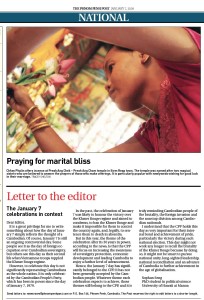Op-Ed: Phnom Penh Post
On the 16th anniversary of its adoption, observers reopen a debate on the founding document’s legacy
 KEY PROVISIONS IN THE 1993 CAMBODIAN CONSTITUTION:
KEY PROVISIONS IN THE 1993 CAMBODIAN CONSTITUTION:
- Article 7: The King shall reign, but shall not govern.
- Article 31: The Kingdom of Cambodia shall recognise and respect human rights as stipulated in the United Nations charter, the Universal Declaration of Human Rights, the covenants and conventions related to human rights, women’s and children’s rights.
- Article 41: Khmer citizens shall have freedom of expression, press, publication and assembly. No one shall exercise this right to infringe upon the rights of others, to affect the good traditions of the society, to violate public law and order and national security.
- Article 44: The right to confiscate possessions from any person shall be exercised only in the public interest.
- Article 51: The legislative, executive and judicial powers shall be separated.
- Article 80: No [National] Assembly member shall be prosecuted, detained or arrested because of opinions expressed during the exercise of his or her duties.
- Article 132: Revision or amendments shall be enacted by a constitutional law passed by the Assembly with a two-thirds majority vote.
AS the Kingdom marks the 16th birthday of its Constitution, adopted with much fanfare on this day in 1993, observers remain divided on the elusive document, opening a debate on whether it stands as a symbol of Cambodia’s emergence from years of war and conflict or a sign of squandered opportunities.
Cambodia’s founding fathers – a motley mix of lapsed Marxists, royalists, nationalist resistance fighters and foreign consultants – spent more than a year drafting a new Constitution together from the Kingdom’s 1947 Constitution and human rights stipulations contained in the October 1991 Paris Peace Agreements.
The Constitution that came into force on September 24, 1993, was a watershed in Cambodian history, containing a separation of powers (Article 51), adherence to international human rights treaties (Article 31) and a series of provisions respecting basic civil rights (Articles 32 to 50).
Coming at the tail end of the United Nations Transitional Authority in Cambodia (UNTAC) and just four months after Cambodia’s first multi-party elections in decades, the Constitution arrived at an important crossroads in the country’s history. But some say the story of the document since 1993 has largely been one of form over substance.
“We have a sophisticated set of documents, but documents are only papers. The facade is there, but there is no democratic substance,” opposition leader Sam Rainsy told the Post.
